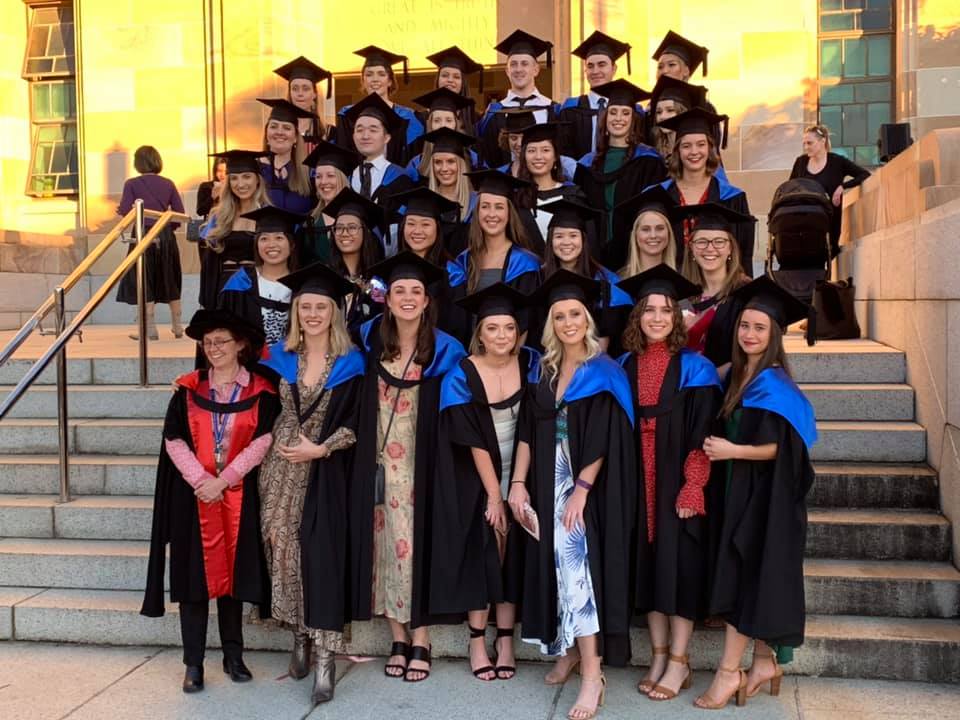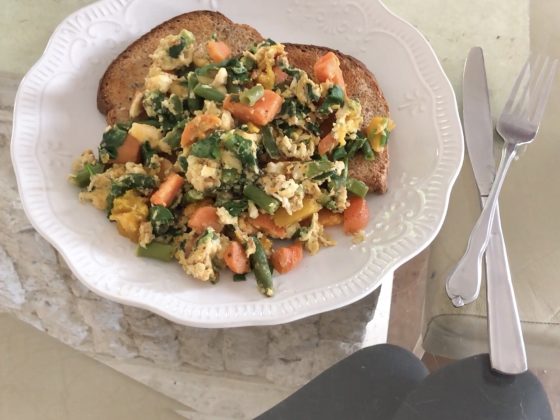



Dietetics Class of 2019
Last July, I graduated with my master’s degree in dietetics, making me a fully-fledged dietitian. So, today I thought I would give you a little insight into the journey of becoming a dietitian. When first looking into dietetics, I had no idea what to expect. Compared to other professions, dietetics is still relatively new and although it’s growing, there isn’t much information about what you do as a dietitian. Let alone what it’s like studying to become a dietitian. So, if you’ve ever considered studying dietetics but wanted more information as to what it’s like, just keep reading!
Becoming a Dietitian
To become a dietitian in Australia, you either do a Bachelor’s Degree that includes Dietetics Studies (e.g. A Bachelor of Nutrition and Dietetics), or you study a Bachelor’s degree related to health/nutrition and then do a Master’s Degree in Dietetics.
Obviously, I chose the latter. The main reason for this being that it was the only option available at the University of Queensland where I was already undertaking a Bachelor’s Degree in Biomedicine (Honours). The second reason is that a Masters Degree in Dietetics is recognised internationally. So, I moved on over to a Bachelor’s Degree in Exercise and Nutrition Science. I could have also done a science degree majoring in nutrition, but I was interested in the physiology courses that came with the exercise component.
Bachelor’s Degree
So what did a Bachelor of Exercise and Nutrition Science look like? Well, aside from physiology and nutrition, other main areas of study included food science, chemistry (I thought it was going to be the death of me), biochemistry, biology, anatomy, statistics and psychology. There were also a few more sports-related subjects (e.g. sports coaching), but I opted for additional psychology courses instead.
A little tip for when you apply for the bachelor’s degree: if applicable, choose the option that also includes automatic entry into the dietetics program (so long as you meet the requirements, that is). At UQ it’s referred to as ‘Bachelor of Exercise and Nutrition Sciences / Master of Dietetics’. It would definitely give you a little more peace of mind, as entry into the Master’s program is highly competitive! Unfortunately, I didn’t know it existed until it was too late and had to apply for the Masters of Dietetics program.
Tips for Surviving A Bachelor’s Degree
- Stay on top of your work all throughout semester. An obvious one, I know, but it makes a huge difference.
- Try to form friendships with classmates. The compulsory courses/units are quite broad, meaning a lot of your lectures have hundreds of people and you rarely get to see the same people. I completely undervalued how important it is to form friendships in my undergrad degree, from being able to help each other with your studies to just having someone there for support. So, if you vibe well with someone, why not plan a study date? They may be struggling to find uni friends too!
- Don’t compromise your health for grades. Making time to eat well and move your body will not only benefit you, but also your grades.
- Remember the why’s. When it gets tough, remember what this means to you. Why are you studying this? What do you hope to achieve with this? How would you like to help others with this?
- Be gentle on yourself. I don’t know anyone who’s had a perfect run. I can recall several times when I wasn’t happy with my grades, but I picked myself up, learnt from the feedback and kept going. In the end, I still got into Dietetics, something I would not be able to say if I had given up.
- If you’re having trouble understanding the content, make sure you attend the tutorials and if needed, email the lecturer. There are also some great online resources on YouTube and other platforms, such as Khan Academy. Also keep an eye out for helpful apps – I highly recommend ‘Essential Anatomy 5’ when you’re studying anatomy.


Master’s Degree in Dietetics
Ok, onto the part you’re probably most curious about, The Masters of Dietetics Program. Quite possibly the most intense year and a half of my life. Intense, but oh so worth it. The amount of knowledge and experience you gain within this timeframe is unbelievable.
So, I would go into specifics about courses/schedules, BUT the dietetics component of every university is run so differently. Even the university I attended had planned on tweaking the course work/scheduling for years to come. So instead I’ll give you a little taste of what you can expect, based on my own experience.
To start with let’s break it down into course work and placements….
Dietetics Course Work
At the university I attended, workshops focused on Medical Nutrition Therapy, Interviewing & Counselling, Applied Food Sciences, Food & Nutrition Service Management and Evidenced Based Practice in Dietetics. Medical Nutrition Therapy, in particular, was the biggest course of them all and focused on how nutrition can be manipulated to improve the health (and prevent malnutrition) in those who are acute or chronically ill. Every 1-3 weeks you would discuss the nutrition therapy for a different medical condition/situation. This was probably my favourite of all the courses!
Hospital & Clinic Placements
at the beginning of the semester/year we were assigned to a specific hospital, clinic and aged care facility to undertake our ‘Professional Practice in Medical Nutrition Therapy’ and our ‘Professional Practice in Nutrition and Dietetics’. When it came to hospital placement, I also decided to specialise in paedatrics. This gave me the opportunity to attend both children’s and adult hospitals and taught me so many valuable skills. If you enjoy working with children and in challenging environments, I highly recommend doing this!
However, in general, placement consisted of conducting screenings, nutrition assessment and nutrition management with patients/clients with all different conditions/situations/backgrounds. Until you’re confident to do this under indirect supervision, you will see patients/clients with both a peer, as well as your preceptor/supervisor. A preceptor/supervisor is typically a dietitian working at the facility who has kindly taken on students to supervise. They will provide you patients/clients to see, feedback on how to improve your practice and in the early stages, step in if you get a little nervous.
Industry Placement
In the third and final semester, we had two lots of four full-time week blocks of industry placement with an assigned nutrition/food-related company. Industry placements were a crowd-pleaser, as you have the opportunity to gain more experience in fields you’re specifically interested in. Or, try new fields that you had never considered! We had the opportunity to work alongside:
- Food development companies
- Nutrition companies
- Food service companies
- Community public health programs
- Hospitals
- Private practices
For both of my placements, I got to combine not only dietetics but my passional for social media. In one placement I was able to create written, photo and video content for a large food service company. In the other I was able to observe the inner workings of a wonderful private practice and create customised resources.
Tips for Succeeding on Placement
- Always be professional/respectful in companies workplaces.
- At first, you may be really feeling the nerves (I know I did). Try your best to transfer the focus from yourself to the patient and you’ll find that the processes come more naturally.
- Always keep your cool, even if you’re in a stressed environment. Be kind to those around you and if your peer is struggling, give them a hand.
- For hospital placement: try to find out your supervisor’s workload (e.g. cardiac, gastrointestinal, etc.) for the upcoming week. This will allow you to refresh your notes and come to placement feeling confident.
- Make sure you have all the necessary resources with you, such as nutrition care process documents, peer evaluations (if your university uses that system), ready reckoners, calculations for estimating protein/energy/fluid requirements, calculations for enteral/parental feeds and any other documents needed.
- Put all of your placement documents into a folder with sleeves (better yet if it can zip up such as a compendium) and keep some pens/pencils, calculator, notebook, access passes (when you’re not wearing them) in the sleeves.
- For hospital: as soon as you have started placements, record into your notebook your preceptor/supervisor details such as name, workload, email and pager number.
- At the back of your notebook, start compiling a list of the medications you frequently come across in patients charts and write down what they’re used for.
- Similar to above, write down all the abbreviations you frequently come across in your notebook and what they mean. Doctors/specialists LOVE abbreviations.
- Carry a water bottle and a couple of snacks with you. You will have long and busy days!
- If you’re unsure of something and can’t find the answers through resources, ask your preceptor/supervisor as soon as they’re free. The sooner, the better.
- Be gracious with feedback, it’s only going to help improve your practice.
- If you’re placed with someone you don’t like, use it as an opportunity to learn to work with all kinds of people. If you feel as if you’re being treated unfairly, bring it up maturely to your program coordinator. However, I never had this issue and I’m sure you won’t either!
Ok, I think I’m going to leave it there. I’ve attempted to cover as much as I can whilst keeping this blog post at a reasonable length. Hopefully this post has given you a little more insight into what is involved in studying Dietetics. If you have any further questions, feel free to comment below or DM me on social media and I’ll get back to you as soon as I can 
Until next time! x










